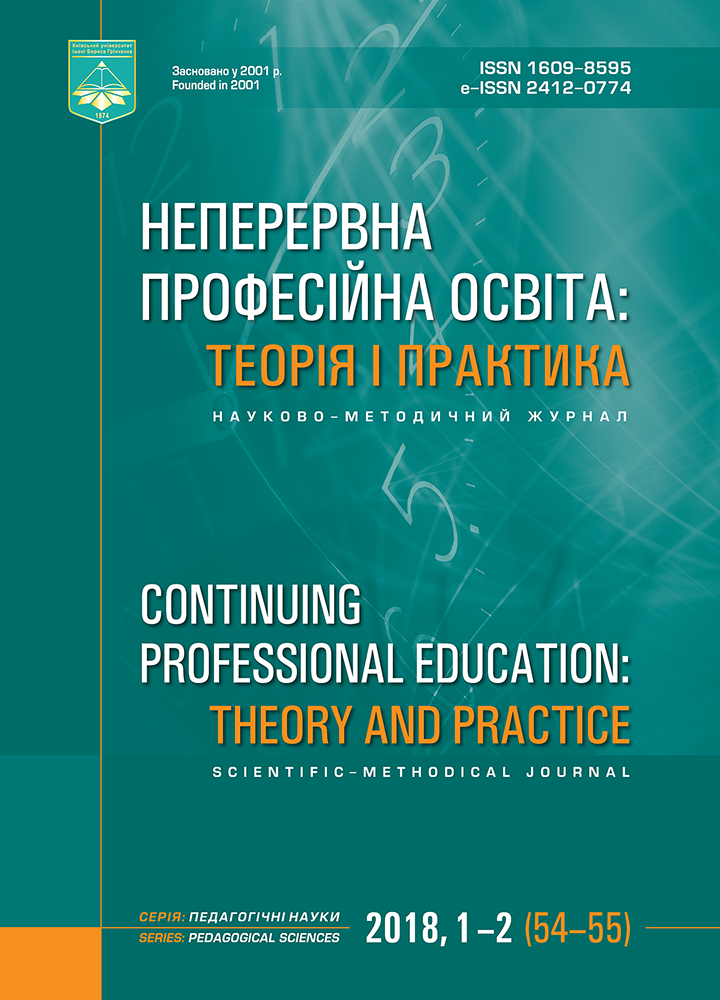ORGANIZATION OF SUBJECT-SUBJECT FEEDBACK WITH HELP OF DISTANCE TECHNOLOGIES AT THE POSTGRADUATE EDUCATION STAGE
DOI:
https://doi.org/10.28925/1609-8595.2018(1-2)6873Keywords:
distance technologies, feedback, postgraduate education, quality management system.Abstract
The article deals with the necessity of establishing feedback with consumers of educational services in the context of implementing the requirements of the International Standard for Quality Management System (ISO 9001) by getting opinions and feedback from educational services users; outlines the feasibility of using remote technologies for feedback organization, in particular at the postgraduate education stage; defines the advantages of using remote technologies during surveys, in particular: communicative, accessible, productive and economical; presents the results of a survey conducted among interns of the Bogomolets National Medical University using remote technologies, in particular, using the e-questionnaire developed with help of Google Forms to determine satisfaction with internship preparation (chosen specialty, teaching quality, manifestations of official abusing and corruption, satisfaction with the direct supervisor of internship, educational materials, material and technical base, etc.); highlights the information obtained during the survey of employees of the Bogomolets National Medical University; describes the practice of remote polling of scientific and pedagogical staff, which is considered not only from the point of view of ensuring effective feedback, but also as part of the training course, since the distance format of the survey creates an opportunity for the teachers to be attracted to the practical application of modern communication technologies in the process of learning.References
Systemy menedzhmenta kachestva – Trebovanyia : mezhdunarodnyi standart [Quality Management Systems – Requirements: International Standard]. Retrieved from http://pqm-online.com/assets/files/pubs/translations/std/iso-9001-2015-(rus).pdf (rus).
Zakon Ukrainy «Pro osvitu» [The Law of Ukraine On Education]. Retrieved from http://zakon0.rada.gov.ua/laws/show/2145-19/print1509621673960023 (ukr).
Bogomolets National Medical University. Official website. Retrieved from http://nmu.ua/documents-of-the-university/sertyfikaty-iso/ (ukr).
Sysoieva, S. O. (2008). Osvita i osobystist v umovakh postindustrialnoho svitu: monohrafiia [Education and personality in the post-industrial world: monograph]. Khmelnytskyi, Ukraine: KhHPA (ukr).
Koval, T. I. (2011). Interaktyvni tekhnolohii navchannia inozemnykh mov u vyshchykh navchalnykh zakladakh [Interactive technologies for teaching foreign languages in higher education institutions]. Retrieved from http://archive.nbuv.gov.ua/portal/Soc_gum/npo/2011_1/Koval.pdf (ukr).
Mulina, N. I. Orhanizatsiia efektyvnoho zvorotnoho zviazku v dystantsiinomu navchanni inozemnykh mov [Organization of effective feedback in the distance learning of foreign languages]. Humanitarnyi visnyk DVNZ Pereiaslav-Khmelnytskyi derzhavnyi pedahohichnyi universytet imeni Hryhoriia Skovorody». Dodatok 1 do Vyp. 31, Tom I (43): Tematychnyi vypusk «Vyshcha osvita Ukrainy u konteksti intehratsii do yevropeiskoho osvitnoho prostoru». Kyiv, Ukraine: Hnozys, 609–616 (ukr).
Wu, R. Feedback in distance education: A content analysis of Distance Education: An International Journal, 1980–2013. Retrieved from https://vtechworks.lib.vt.edu/bitstream/handle/10919/52582/Wu_R_D_2014.pdf;sequence=1 (eng).
Ypsilandis, G. S. Feedback in Distance Education. Computer Assisted Language Learning. 2002. Vol. 15, Issue 2, 167–181. doi: 10.1076/call.15.2.167.8191 (eng).
Downloads
How to Cite
Issue
Section
License
Copyright (c) 2020 Oleksandra Lysenko

This work is licensed under a Creative Commons Attribution-NonCommercial 3.0 Unported License.



